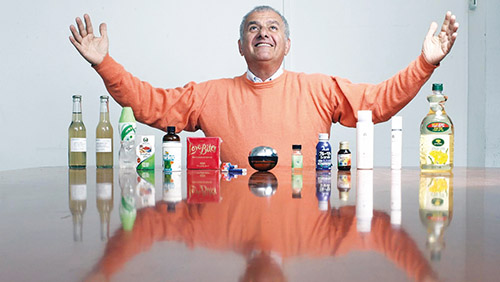
Prof. Nissim Garti’s liquid nano vehicles deliver oral or topical formulations of drugs usually delivered only by needle.
Orly Shani, 68, has adult polyglucosan body disease (APBD) — a rare genetic neurodegenerative disease affecting muscles from the hips downward.
Several years ago, she located scientists in the United States and Spain who synthesized a bioactive molecule as a possible remedy. In experiments done in Israel, this novel powdered compound restored damaged neurons when injected twice a day in a mouse model of APBD.
To test it on humans, they needed a treatment regimen that would be easier on the body.
“My husband was talking about it with friends,” Shani said, “and one of them is a physician. He said he knows a professor at Hebrew University, Nissim Garti, who can turn a powder into a syrup in a patented process.”
Garti’s LDS (Lyotropic Delivery Systems) Biotech company develops shelf-stable liquid “nano-domain” vehicles ready to be loaded with oral or topical formulations of drugs that otherwise could be delivered only by injection or infusion.
“It is always difficult for a drug to cross any kind of membrane, whether from the stomach to the bloodstream or the front of the eye to the back of the eye, or across layers of skin or through the nails,” Garti explained. “Our technology can transfer FDA-approved bioactive drugs across these barriers.”
The nano-domain “bus” parks itself on the target organ or muscle’s membrane barrier with a sticking action that triggers the membrane to open and allow the “cargo” to flow through in a controlled manner – completely bypassing the liver, where meds can cause toxicity.
About a year and a half ago, Israel’s Health Ministry permitted Shani to receive Garti’s liquid reformulation of the powdered experimental drug, on a compassionate use basis, at Hadassah Hebrew University Medical Center in Jerusalem.
“It’s a miracle,” Shani told Israel21c. “It works better even than an injection. When I started taking it, I couldn’t stand or walk. Now I stand by myself and walk with a walker. I can swim and stand in a pool. I can get in and out of bed myself. And the improvement is continuing. I know someday I will be back on the dance floor.”
Two more APBD patients are now showing progress on the formulation as well, Garti reported.
While this drug is not yet in clinical trials, many of Garti’s other nano-domain formulations are being tested on patients for a variety of applications at medical centers in Israel and the United States.
The most advanced application of the LDS technology is a much more common condition — nail fungus.
“There is no cure today for nail fungus except an oral drug that can cause liver problems, so doctors don’t like to use it,” said Garti. “Topical medications are available, but our delivery system gets the drug through the nail all the way to the basis of the fungus, killing it completely.”
Garti believes this application, nearing the end of a Phase I/II trial at an Israeli hospital, could be a gamechanger.
“We make all our formulations very safe so if someone makes a mistake in dosing it’s no problem,” said Garti, the award-winning previous director of Hebrew University’s Casali Institute of Applied Chemistry.
LDS has two divisions, each working with multinational partners: one that develops nanotechnology drug-delivery systems for generic and innovative pharmaceuticals, and another for nutraceuticals and derma-cosmetics.
Innovative pharmaceuticals include combinations of cannabis components, such as CBD, embedded in nanodroplets to treat six different diseases.
“The idea is that it is easier to take because it’s in liquid form with high bioavailability and high efficacy,” said Garti. “We are now doing Phase I and II clinical trials in six hospitals in the United States and one in London.”
Already, some over-the-counter CBD products developed by Garti are being sold in North America under the Hygia brand, including a transparent gel to relieve muscle pain that can be encapsulated for oral delivery.
The goal of delivering treatments without needles is a high priority across the world. Many Israeli nanotech entrepreneurs and researchers are attempting to design ultra-tiny vehicles such as nanodiamonds, nanorobots or a nanoparticle nasal spray to fill this need.
Garti said LDS is among the most advanced of these initiatives, with about 20 patents already granted and 37 more in the approval process.
By Abigail Klein Leichman/Israel21c.org










